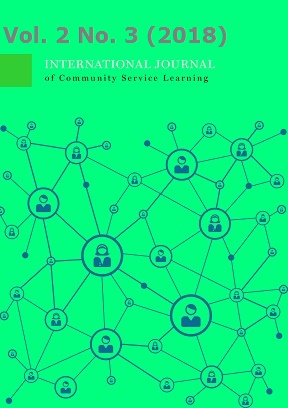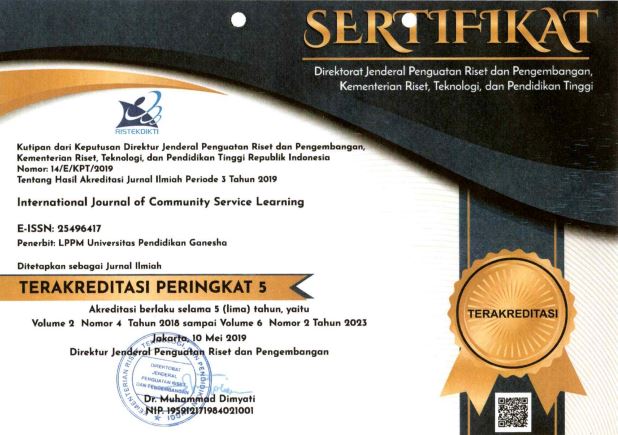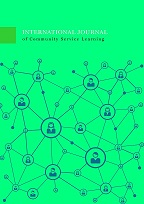Inmate Empowerment Through Training in Making Bags Made of Rope as a Provision of Skills
DOI:
https://doi.org/10.23887/ijcsl.v2i3.15478Abstract
Community service team, Elementary School Teacher Education Universitas PGRI Madiun has conducted training in making bags made from raw rope for inmates in prison Ngawi class II B as a provision of skills. The purpose of the abdimas is (1) Provision of skills to the prisoner by inviting the prisoners to perform a creation in the form of a rope bag (2) to create economic independence for the prisoners through training on making bags made from rope, (3) to encourage or support the prisoner again have confidence. Training activities begin with the opening and delivery of materials and discussion and evaluation. Training in making bag made from rope made with direct practice in bag making. Training training is emphasized on improving skills and motivational motivation for prisoners to remain confident in their work. It can be concluded that in the training of making bags made from raw rope has been done with bai. Based on the questionnaire results, 86% of participants gave an assessment that the training of bag making made from raw ropes for prisoners in Ngawi Class II class B institution is very motivating in increasing the skills of the participants.
References
Ardilla, F., & Herdiana, I. (2013). Penerimaan diri pada narapidana wanita. Jurnal psikologi kepribadian dan sosial, 2(1), 1-7Harida, H. N. (2010). Kegiatan Pelatihan Keterampilan Bagi Narapidana (Studi Kasus Pada Lembaga Pemasyarakatan Anak Klass IIA Blitar). SKRIPSI Jurusan Pendidikan Luar Sekolah-Fakultas Ilmu Pendidikan UM.
Hukum, D. K. F., Hukum, D. I., & Camar, H. Y. Pembinaan Narapidana Dalam Pemenuhan Upah Atau Premi Di Dalam Lembaga Pemasyarakatan Kelas I Kedungpane Semarang.
Kabbaro, H., Awawin, M., Wibowo, B. A., Rahmawati, Y., & Rachmawati, M. (2013). “Komunitas Berani Bangkit” model pembinaan tahanan dan narapidana di bawah umur di lembaga pemasyarakatan kelas iia kota bogor dengan pengembangan kewirausahaan, pengekspresian rasa melalui kreativitas seni, pengembangan kemampuan spiritual, dan pencitraan positif di kalangan masyarakat.
Lestari, D. A. (2016). Keterampilan Membatik Bagi Narapidana di Lembaga Pemasyarakatan Klas IIB Blitar. Jurnal Tata Busana, 5(1).
Mariana, A. A. (2017). Dampak Pelatihan Life Skill Terhadap Perkembangan Kreativitas Narapidana Di Cabang Rumah Tahanan Kotapinang (Doctoral Dissertation, Unimed).
Mayasari, R., Mansur, M., Mursalat, M., & Fajrin, F. (2016). Pengembangan Resiliensi Narapidana Perempuan Muslim melalui Pelatihan Keterampilan Resiliensi Islam.
Mudiarti, L. (2017). Pemberdayaan Mantan Narapidana Di Kabupaten Jepara Melalui Pelatihan Pengolahan Aneka Produk Perikanan. Jurnal Disprotek, 7(2).
Perdana, R. P. (2014). Pengaruh Program Pelatihan Terhadap Kompetensi Narapidana Pada Lembaga Pemasyarakatan Kebonwaru Kota Bandung (Doctoral dissertation, Universitas Widyatama).
Pradiantiwi, D., Safitri, R. W., & Prasasti, P. T. A. (2018). Character Education For Prisoners Soft Skills To Empower Through Asinan Trasi In The Correctional Instution Ngawi. Research Report.
Team, R. (2012). Gambaran Orientasi Masa Depan Narapidana Remaja Sebelum dan Setelah Pelatihan di Rumah Tahanan Negara Kelas 1 Bandung. Majalah Keperawatan Unpad, 12(1).
Yulianti, S. A., & Widiasih, R. (2009). Gambaran orientasi masa depan narapidana remaja sebelum dan setelah pelatihan di rumah tahanan negara kelas 1 bandung. Jurnal Psikologi, 10, 97-104.
Downloads
Published
How to Cite
Issue
Section
License

International Journal of Comunnity Service Learning is licensed under a Creative Commons Attribution-ShareAlike 4.0 International License.













